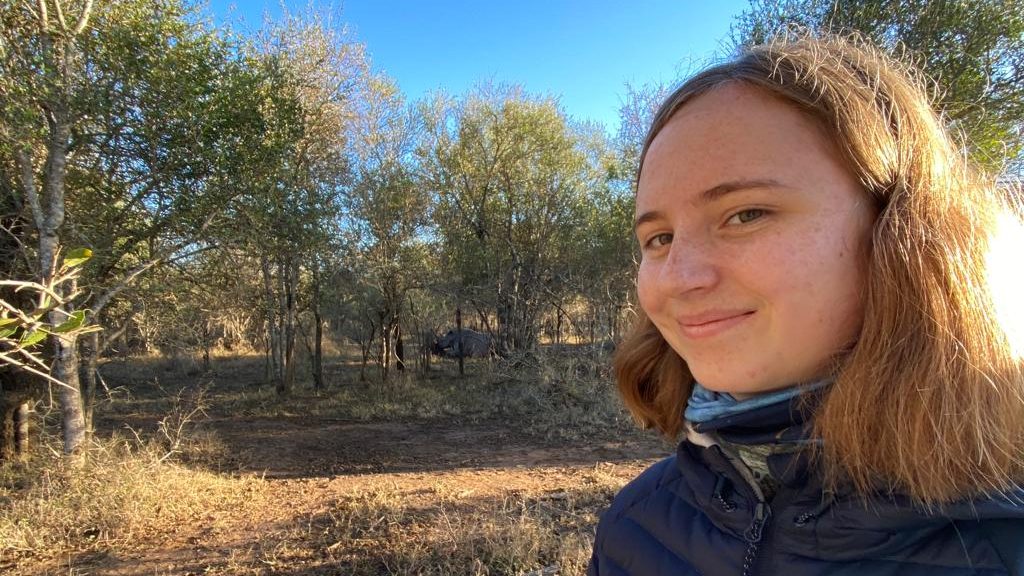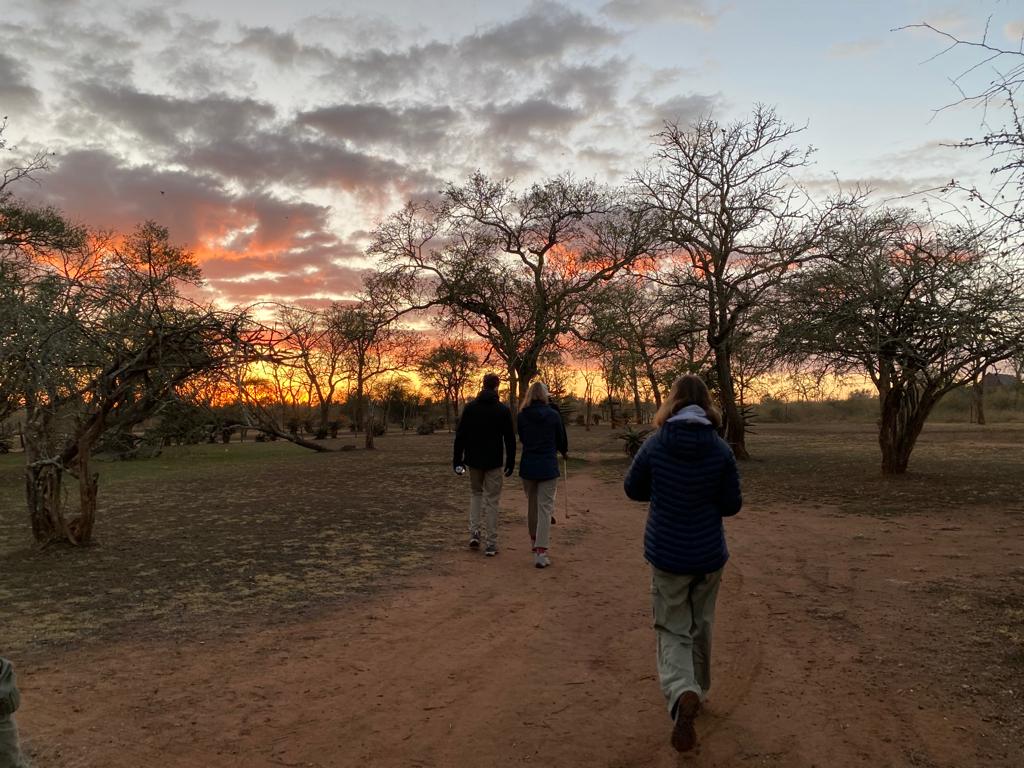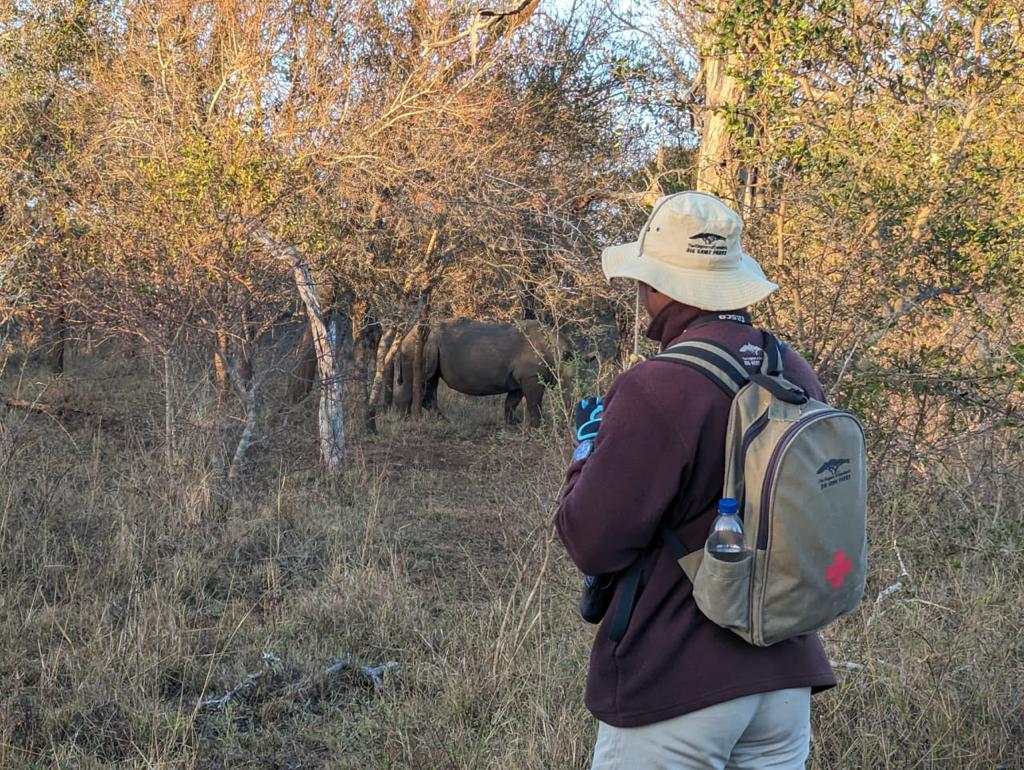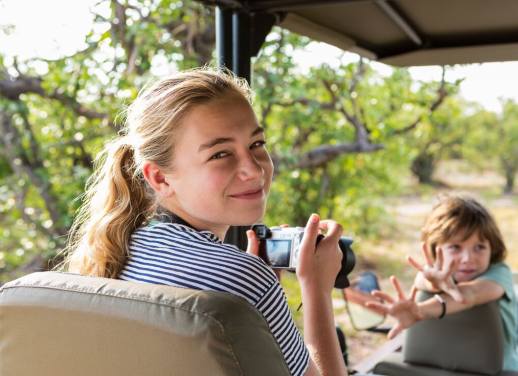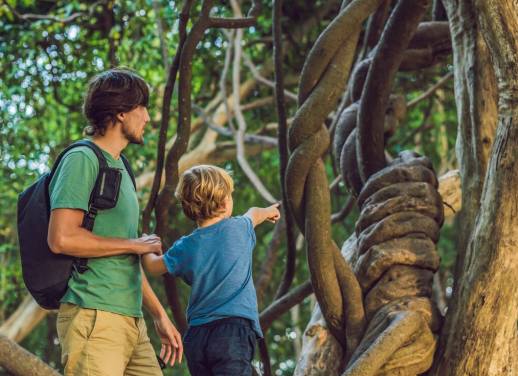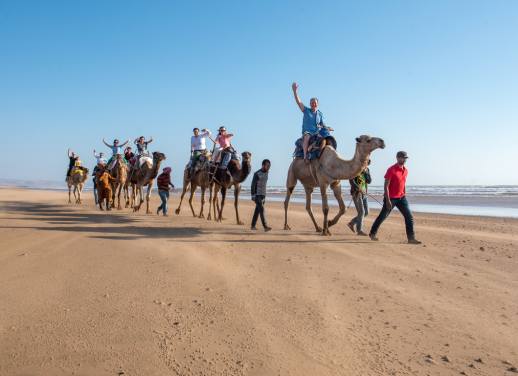On a family safari trip to South Africa, 16-year-old Imogen experienced both the highs and lows of travel and has message to share about adventuring mindfully and responsibly.
I’ve never been so excited to see poop in my life. A group of us were gathered around a huge steaming pile of it.
At 5 am in Hlane National Park, Swaziland is awash in a pastel haze. The leadwood trees create silhouettes against the stripes of pink and yellow that the sun paints as it rises slowly into the sky. Above me, birds twitter and chirp, filling the silence with their great African chorus.
We had followed behind our park guide Johannes, zig-zagging single file from road to animal track and into a clearing circled by a copse of trees crowned in golden light.
Along the way, Johannes would periodically stop suddenly and raise his hand, listen, smell the wind and taste the grass before motioning for us to move forward.
A few steps ahead of the poop, Johannes stood stock still. Adrenaline was coursing through my body and I had to will myself not to shake. There, through the trees, was not one, but two rhinos.
But there they were: two southern white rhinos. A breath caught in my throat. No number of words can sum up the magic of that moment.
It was a mother and a teenage son, Johannes whispered to us. Fitting, given that we were on Intrepid’s 12-day South Africa Family Safari with Teenagers.
After watching the rhino until they wandered off, we bounced back to camp. Seven teenagers had joined this trip, ages 12 to 16, with their parents. There we were, the new Intrepid generation, munching on chocolate pancakes while talking about our third Big 5 sighting (so far we had seen elephants and buffalo) and examining our souvenirs.
I was grateful for my souvenir: fresh rhino poo on my new cargo trousers. That might sound strange, but my generation is inheriting a world with dwindling animals and natural wonders. The rhino poo on my trousers was a reminder of the importance of appreciating and preserving what’s left.
Taking teenagers travelling isn’t something to be anxious about. It’s not always easy, we have a lot to learn, but also a lot to teach. The virtual world may be our escape (and often our addiction) but we still have a thirst for adventure and understand the importance of doing that responsibly better than most.
I do feel the teenagers became better friends than the adults on our trip. We bonded over everything from our school experiences, interests and hobbies to the animals we were seeing.
In the remote and untouched wilderness of our campsite, every encounter felt precious. There was no electricity, no mobile signal and definitely no wi-fi. Instead, there were hippos on one side of our campsite, lions on the other and starry skies above.
I guess we were so remote that all ties were naturally severed, apart from one: human connection. So, it was easier than we had first thought to disconnect from the online world. We dared to defy the stereotype that teenagers are buried in their phones by throwing ourselves deep into the African bush.
We listened eagerly to Intrepid leader Hildon’s stories about growing up in the bushveld with a conservationist father. We laughed with our chef, Nolo, as we helped her prepare dinner. We played cricket with our driver Leroy.
Our parents, meanwhile, found quiet spots to relax with their Kindles and headed back to the tent for an early night, urging us to follow them. Instead, the kids chatted late into the night by the embers of the fire. It felt freeing to forget our phones and get back to basics. We had only known each other for five days yet we talked as if we were old friends.
I’m lucky enough to go on Intrepid’s family vacations with my parents frequently, and my mum says she’s often noticed that parents go on these trips for their kids to make friends. From my perspective, I do feel the teenagers became better friends than the adults on our trip. We bonded over everything from our school experiences, interests and hobbies to the animals we were seeing.
I have two older sisters who are in their twenties, so most of the time, I’m the only child at home. We don’t often travel with my siblings, so being in a group situation enriches the experience for me because I’m with people my age.
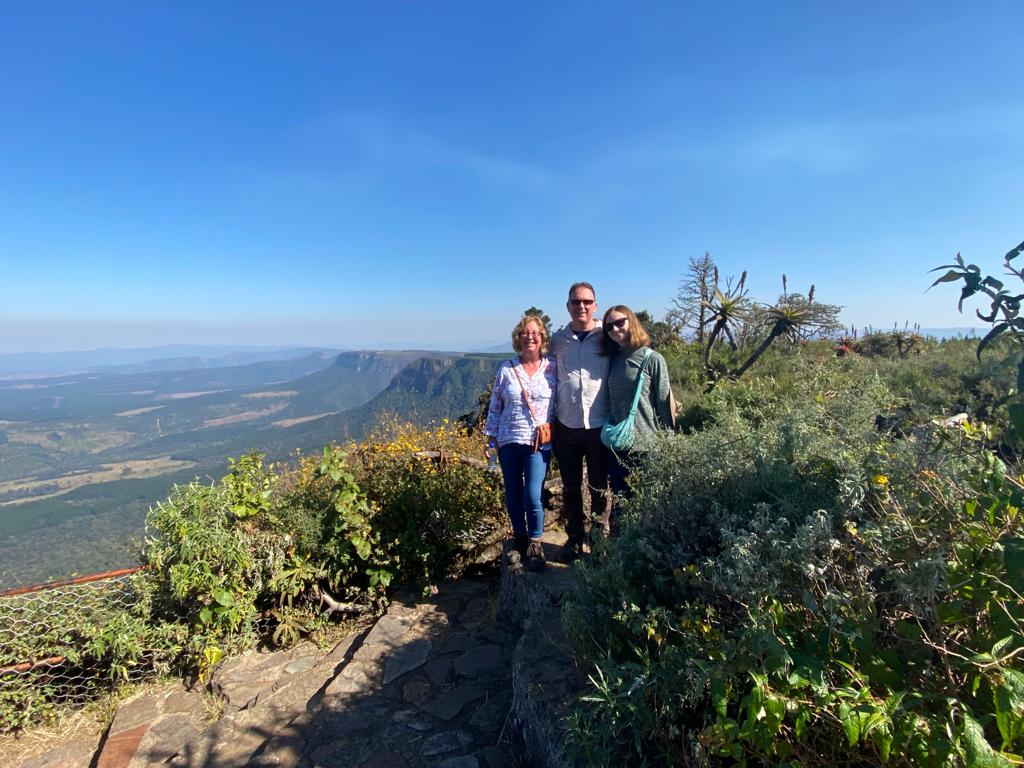
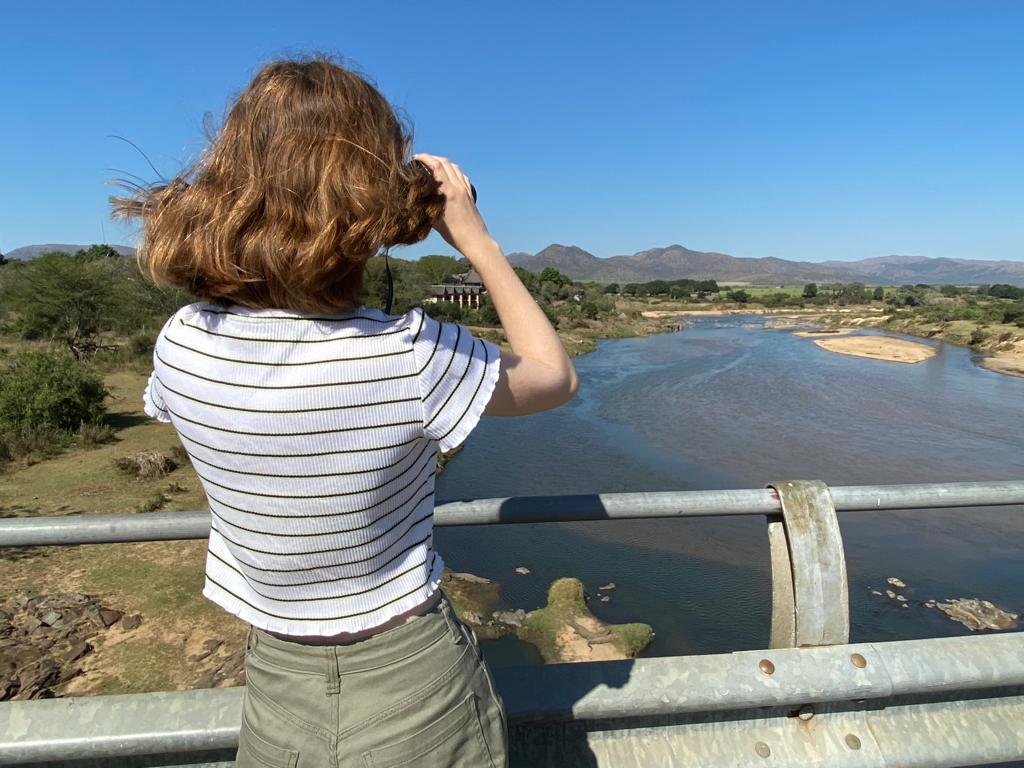
In Kosi Bay, South Africa, we were scattered across the sandy forest, staying in lodges with a pool. It was 7 degrees Celsius, but you could hear our loud sploshes followed by happy, shivery screams for miles.
Our parents took advantage of the bar’s cold beer and wi-fi. We decided to leave our online worlds behind a little longer and search for glinting eyes in the dark instead. Because when would we ever be this age again spotting a giant bush baby in the coastal forests of South Africa?
Our parents didn’t see the huge wide, intrigued eyes that stared at us through the shadowy branches, and they never laughed with us as I jumped at 13-year-old Will’s monkey noises and 13-year-old Kate fell over in the sand.
All too soon, we found ourselves on the last day of our safari in Kruger National Park. Our last chance to spot the elusive leopard, the final member of the Big 5.
Throughout our travels in southern Africa, we had encountered many different animals, from samango monkeys to elephants and crocodiles to banded mongoose.
We had even been chased by two lions in Hlane National Park when they had awoken from their slumber in the middle of the road and saw a truck full of tasty teenagers. Our guide was forced to reverse, much to the relief of a mum in the front seat and to the joy and excitement of everyone else.
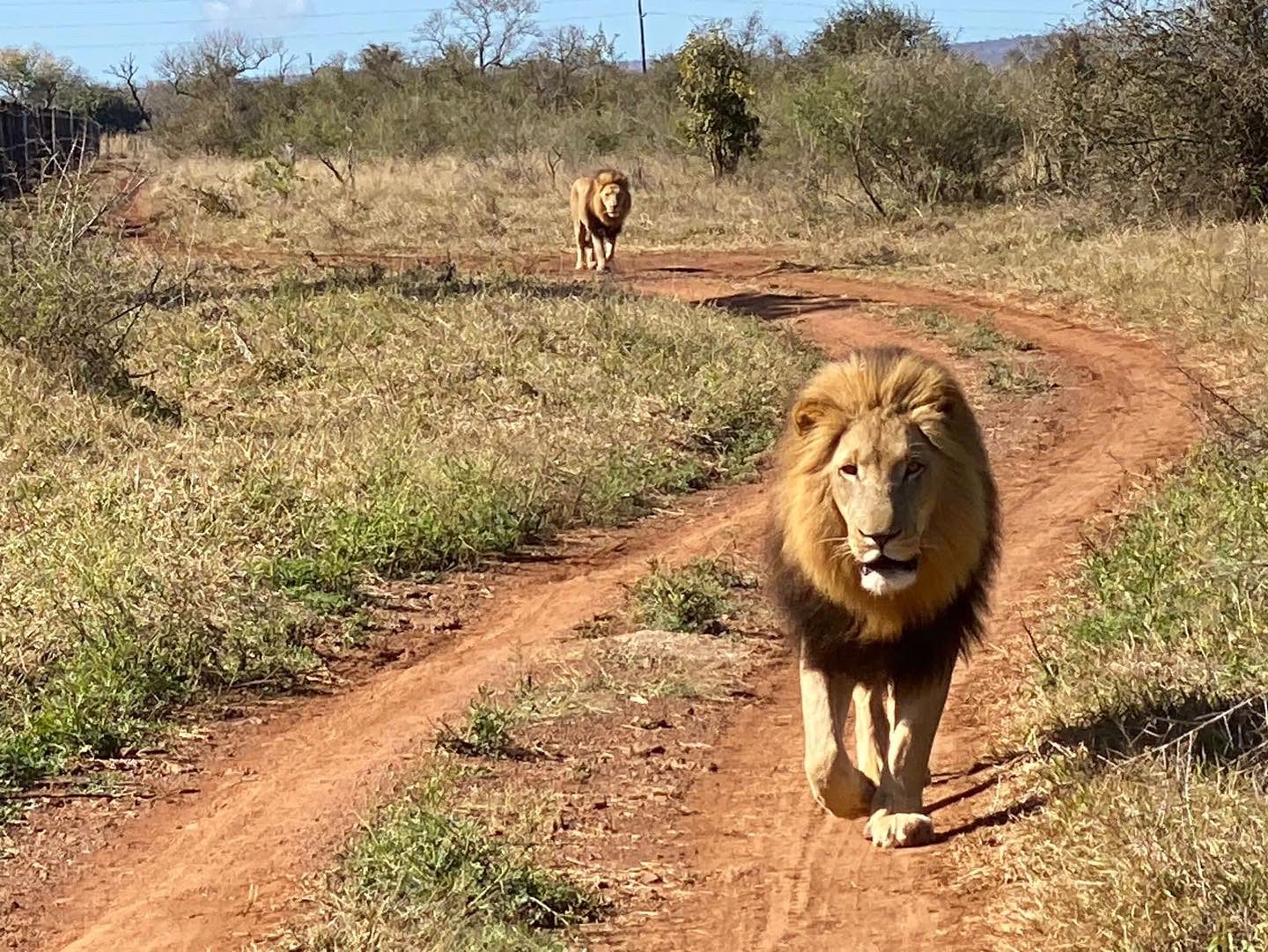
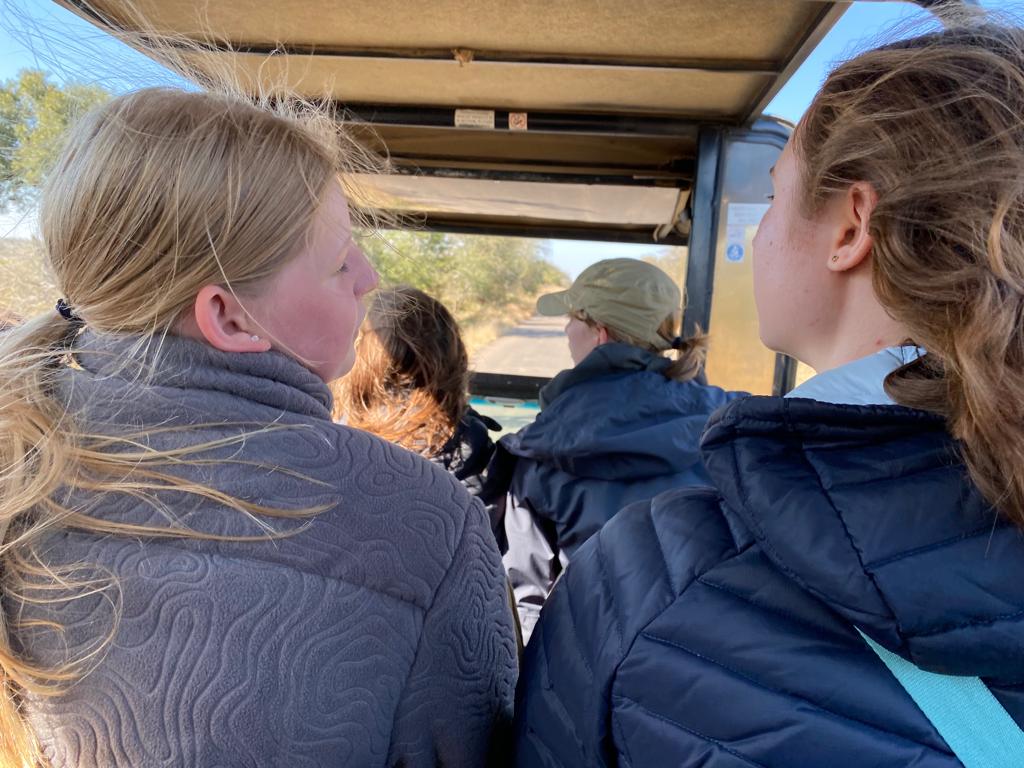
Early on our final morning we found a red ‘blob’ in a tree. Upon closer inspection, it was an impala slung over a branch, bloody entrails cascading down like a demonic waterfall. Our resident vegetarians had to look away. It was definitely a leopard kill, our Kruger guide assured us. However, as there was no sign of the predator, we decided to continue with our safari and returned in the afternoon.
Later, still itching to see a leopard, we came back along the road, and as we rounded a corner, we didn’t need confirmation that the spotted creature had made its appearance. A jumble of safari vehicles, 4WDs and muddy Porsches blocked the road.
As we joined a haphazard queue of cars lining up from every direction, we could see that on the side closest to the tree with the leopard, people were leaning out of their windows holding heavy cameras with lenses that seemed a metre long. The shutters echoed like gunshots.
Along the rest of the road, people in vehicles were getting frustrated because they couldn’t see past the photographers in their 4WDs. A guide from a jeep behind us tried in vain to get everyone into two working lanes but too few people were cooperating.
While we were waiting our turn, an older man in a black Mercedes who had his fill of seeing the leopard was trying to leave and beeping his horn at a car in front of him. While we couldn’t quite see the leopard, we could tell he was getting agitated because of how the tree was shaking. The man slammed on his horn aggressively and didn’t seem to care about that.
We had hoped and hoped, and in the last hour of our final safari, the leopard appeared – a symbol of wildness and beauty and of finding yourself in the right place at the right moment.
Eventually, he passed by us, beeping his horn and we shouted, ‘Stop, you’ll scare it!’ The man just glared at us, beeped again, throwing us a nasty smirk. We quietened, not wanting to provoke him further and distress the leopard.
As the traffic crawled, we made it to a point in the queue where we could see over the tops of vehicles, past the cameras and through the foliage. We finally got a proper look at the leopard. He was laying on the branch next to his kill, wafting his tail to combat the swarming flies. Gracefully, the leopard yawned, stretched and got to his feet, his spots undulating like a rolling wave.
Kate was reduced to tears. We hugged her, smiling. She didn’t need to explain why she was overcome with emotion. We all were. We had searched for days for this evasive creature. We had hoped and hoped, and in the last hour of our final safari, the leopard appeared – a symbol of wildness and beauty and of finding yourself in the right place at the right moment.
Yet, here on this traffic ridden road in the centre of Kruger National Park, we caught a flash of the darker side of tourism. The mud-splattered Porsches and heavy-duty cameras were a strong reminder of the need to be a considerate and respectful tourist. As the new Intrepid generation, we understand, better than most, the fragility of the world we’ve inherited.
The leopard was now pacing up and down the thick gnarled branch with authority. It felt like he was reminding us that this was his kingdom, not ours. After having our moment, we managed to get through the throng of vehicles lining up to start making our way back to camp.
Our guide asked if we wanted to go back through to see it again and take some better photos. The adults began to nod slowly. But the new Intrepid generation all said no, because that wouldn’t be fair to the other people who hadn’t had a chance to see it. We believed only one car at a time should approach the leopard, taking a moment to appreciate and capture the scene before making way for others to do the same.
Despite the poor display of humanity we had just witnessed, we were ecstatic to have seen the leopard. We hugged each other, wiping away tears and chanting ‘Big 5! Big 5! Big 5!’ into the sunset.
Imogen and her family travelled on Intrepid’s South Africa Family Safari with Teenagers, one in a range of trips exclusively for families with teenagers. Discover more family trips.

